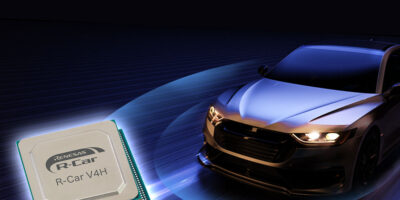R-Car V4H SoC achieves deep learning for automated driving
For central processing in advanced driver assistance systems (ADAS) and automated driving systems, the R-Car V4H SoC achieves deep learning up to to 34 tera operations per second (TOPS). This equips it for high speed image recognition and processing surrounding objects using automotive cameras, radar and lidar, said Renesas Electronics.
The R-Car V4H allows customers to develop cost-competitive, single-chip, ADAS electric control units (ECUs), said Renesas. It combines IP and hardware optimisation, to support driving systems appropriate for automated driving levels 2+ and 3, which are responsible for managing the highest volume of processing, including full NCAP 2025 support. The R-Car V4H also supports surround view and automatic parking functions with 3D visualisation effects such as realistic rendering.
The SoC development process targets ASIL D systematic capability for all safety relevant IP for ISO 26262 functional safety. The signal processing portion of the R-Car V4H is expected to achieve ASIL B and D metrics for the real time domain.
Renesas provides a dedicated power management for the R-Car V4H based around the RAA271041 pre-regulator and the RAA271005 power management IC (PMIC). This enables a power supply for the R-Car V4H and peripheral memories from the 12V supply of the vehicle battery at low power operation while targeting ASIL D compliance for systematic and random hardware faults with a low bill of materials cost, confirmed Renesas.
An R-Car V4H software development kit (SDK) is available for initial device evaluation, and software development including deep learning. The SDK offers full functionality for machine learning development, and optimisation of embedded systems for performance, power efficiency, and functional safety. Complete simulation models are available. The software is operating system-agnostic, pointed out Renesas. When developing from scratch, Fixstars’ Genesis platform enables engineers to evaluate R-Car from anywhere via their cloud solution and can provide CNN benchmark results.
The SoC has four Arm Cortex-A76 cores operating at 1.8Ghz for a total of 49kDMIPS of general compute, three lockstep Arm Cortex-R52 cores at 1.4Ghz, for a total of 9kDMIPS to support ASIL D real time operation and eliminate the need for external microcontrollers. There is also dedicated deep learning and computer vision IP, and image signal processor (ISP) with parallel processing for machine and human vision, image renderer (IMR) for fisheye distortion correction or other mathematical operation and an AXM-8-256 GPU operating at 600MHz, for a total of over 150 GFLOPS. There are also dedicated automotive interfaces (CAN, Ethernet AVB, TSN and FlexRay) and two fourth generation PCIe interfaces.
Samples of the R-Car V4H SoC are available now, with mass production scheduled for the second quarter of 2024.




